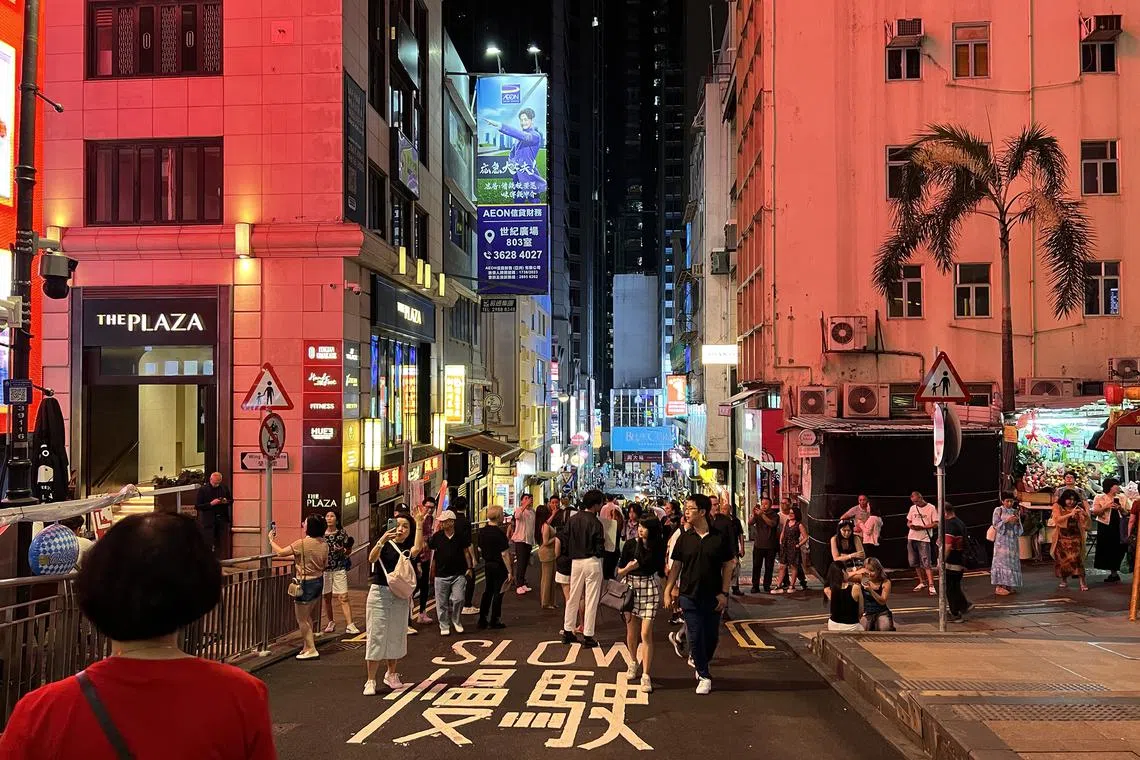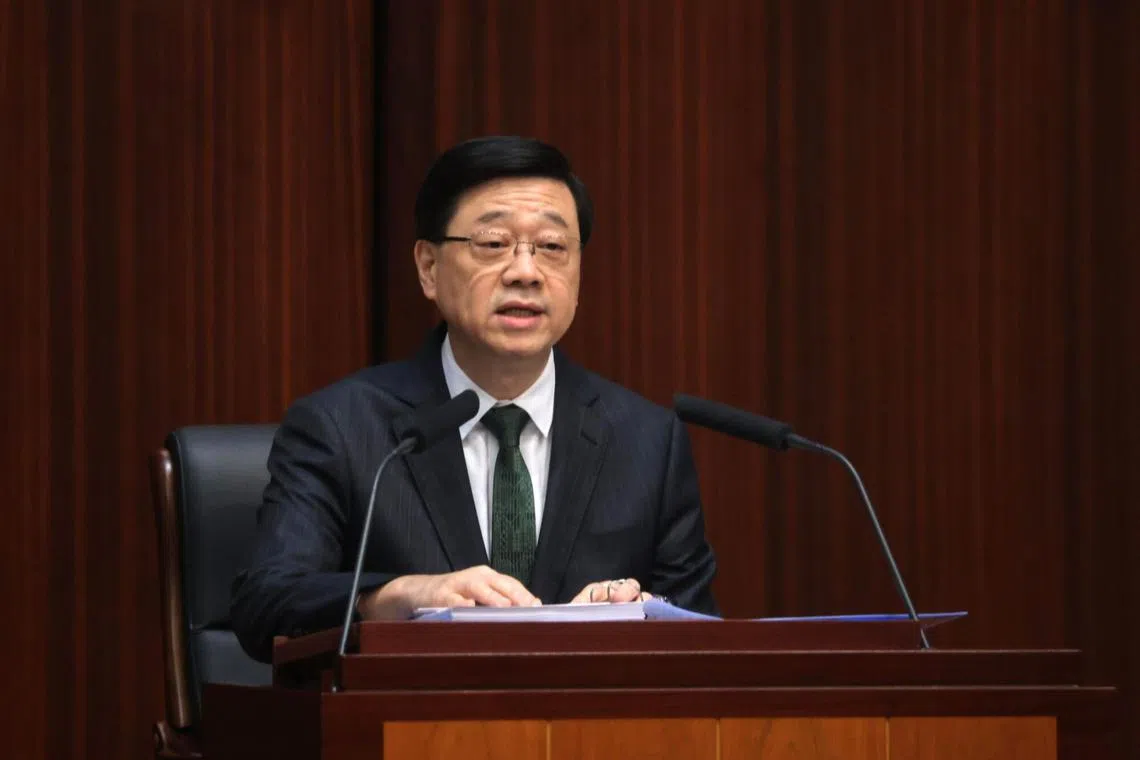News analysis
Talent, tourists and new hubs: John Lee lays out ambitious HK revival plan
Analysts say the measures in his policy address lack focus.
Sign up now: Get insights on Asia's fast-moving developments

Retail sales in Hong Kong dropped by a worse-than-expected 10.1 per cent in August from a year ago, the sixth straight month of decline.
ST PHOTO: MAGDALENE FUNG
Follow topic:
HONG KONG – If there was one thing Chief Executive John Lee made abundantly clear in his annual policy address on Oct 16, it was the urgency of finding big new ways to inject fresh impetus into Hong Kong’s struggling economy.
Ahead of his speech, Mr Lee had promised that the economy would be at the centre of his 2024 policy address, “so as to let our people enjoy better lives”.
He kept his word. The third annual speech in his five-year term
“In the reform process, we have to decide what should be built from scratch, what should be overhauled to set things right, and what should be consolidated and bolstered,” Mr Lee said in his 2½-hour-long speech. “In taking forward reforms, we must have a systemic mindset.”
However, analysts interviewed by The Straits Times wondered if the government, in announcing its more than a dozen major initiatives, had carefully considered what levers it needed to pull in order to turn things around.
Mr Lee’s ambitious blueprint for Hong Kong has wide-ranging plans to bring in fresh talent, boost tourism, strengthen trade and build ecosystems for new hubs in various industries.
They include:
(i) Introducing new scholarships, expanding a talent scheme, and easing some visa rules to attract more high-quality students and professionals, particularly from Asean and Belt and Road countries, to study and work in the city.
(ii) Instituting Muslim-friendly facilities and service information in Arabic, scrapping arrival and departure cards for international visitors, developing “yacht tourism” and the arts scene, and pursuing both “quality and quantity” in hosting mega events to draw more tourists to the city.
(iii) Slashing a longstanding 100 per cent tax on premium hard liquor to just 10 per cent for the portion priced above HK$200 (S$34) to spur the bar business and spirits trade; and setting up a global gold trading centre that can store and transport the precious metal as a step towards building a broad commodities trading ecosystem.
(iv) Exploring a low-altitude economy to use drones for deliveries; setting up a HK$10 billion innovation and technology fund to support emerging industries of strategic importance; leveraging on the city’s sporting strengths to pursue sports arbitration; boosting its biomedical research capabilities, and developing the city’s traditional Chinese medicine industry.

Hong Kong Chief Executive John Lee delivering his policy address at the Legislative Council in Hong Kong on Oct 16.
PHOTO: BLOOMBERG
Economy needs help
The measures cover a lot of ground, and it is not hard to see why – the Hong Kong economy is in desperate need of a leg-up.
Mr Lee’s plans come against a backdrop of deepening economic concerns amid a mainland slowdown and sustained weak domestic consumption that has hit a long string of businesses across sectors all around Hong Kong.
Retail sales dropped by a worse-than-expected 10.1 per cent in August from a year ago, the sixth straight month of decline. Sales in nearly every key category fell – from cars to jewellery, furniture, electronics, even shoes and clothes – despite visitor arrivals rising by 9.2 per cent year on year.
In the last two months alone, notable businesses that announced their closures included supermarket chain Uselect, which at its peak had some 100 stores in the city, health goods chain CR Care’s 19 outlets, gym chain Physical Fitness’ 23 branches, and US chain Garrett Popcorn’s five remaining shops.
While gross domestic product grew by 3.3 per cent in the second quarter from a year ago, led by strong export demand, and is expected to expand by 2.5 per cent to 3.5 per cent for the whole of 2024, dwindling new stock listings indicate continued weak sentiment as interest rates remain high, and mainland stock valuations stay low.
Property prices have also fallen by around 25 per cent since borrowing rates started rising in mid-2022. Bankruptcies hit a two-year high in May, and distressed sellers’ hugely discounted assets have pushed home prices down to nearly an eight-year low.
Poverty, meanwhile, has grown, with one in five Hong Kongers now considered poor.
Mr Lee’s latest blueprint for Hong Kong provided continuity, clearer details and some fresh ideas to build on the many paths towards diversifying the economy he had mapped out in his first two policy addresses.
His measures for developing new hubs in multiple industries are also aligned with Beijing’s exhortations for Hong Kong to transform its economy and reignite growth.
Mr Lee’s first policy address focused on a new talent attraction scheme, while his second eased key property curbs.
Doing too much?
But with myriad priority areas, analysts question whether this might mean a lack of policy focus.
“John Lee has adopted an all-out strategy to boost the economy in response to the central government’s call for him to do so,” Associate Professor Alfred Wu, from the Lee Kuan Yew School of Public Policy in Singapore, told ST.
“But taken together, the policies look to me a bit like ‘sa hu jiao mian’ – or literally, sprinkling pepper – the Chinese idiom used metaphorically to describe the act of distributing a limited resource thinly, or over a wide area, without focus or depth.”
Mr Gary Ng, a senior economist at investment banking firm Natixis, described the policy address as “a barrage of arrows shooting at small and multiple goals”.
“The question is whether they have the right targets,” said Mr Ng.
“If the financial sector regains momentum, it will naturally support most sectors, such as professional services, properties and retail. But it is unclear what the government wants to do… (and) whether the money is spent wisely.”
“The government should cut unnecessary spending and focus on key areas to solve the structural problems, such as economic growth, housing and healthcare,” he added.
Associate Professor Billy Mak at the Hong Kong Baptist University’s Department of Accountancy, Economics and Finance said he could see the long-term merits of some of Mr Lee’s measures, including the global gold trading hub, which would contribute to developing the city’s commodities market.
“The policies to boost tourism will help enhance Hong Kong’s international image over time… (while) attracting more talent from parts of the world beyond the West will diversify our talent pool,” Dr Mak told ST.
More diverse talent could provide the city with expertise in new growth areas such as in Islamic financing, which Hong Kong has long sought to develop, he added.
Prof Wu said it remained to be seen how effective the measures would be.
“We may have the tendency to want to judge policies by their intentions. But it’s the results, the final outcome of those policies, that matter,” he said.


